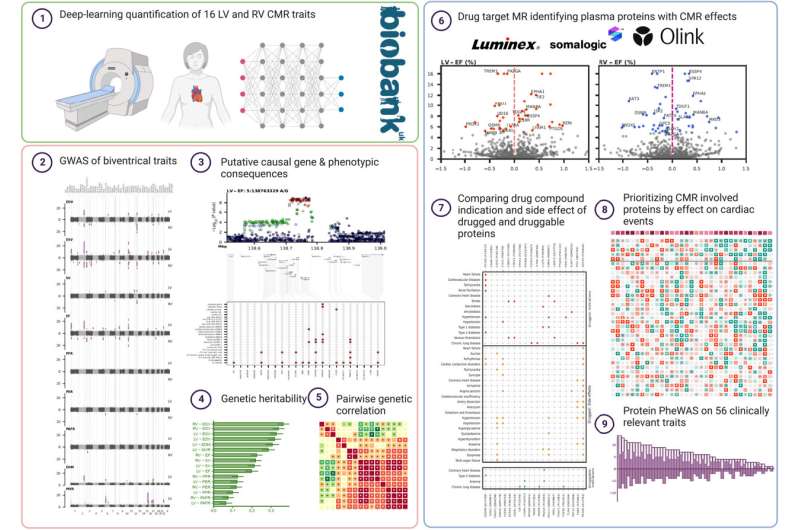This article has been reviewed according to Science X's editorial process and policies. Editors have highlighted the following attributes while ensuring the content's credibility:
fact-checked
peer-reviewed publication
trusted source
proofread
Cause of heart damage from cancer drugs identified

Modern drugs can be very effective at treating cancer and have led to greatly improved survival rates. However, some cancer treatments can cause damage to the heart, or cardiotoxicity. This damage can present in a range of ways, from a slight change in the heart's pumping ability to debilitating heart failure. But the ways in which these drugs cause damage have remained elusive.
Now an international study published in the journal Science Advances, has identified proteins in the blood that are linked to an increased risk of developing heart diseases, including heart failure (where your heart can't pump blood around your body as well as it should), and which are also affected by drugs used in cancer treatment.
The team say that their findings can explain how cancer drugs cause their damaging effects on the heart and could help to identify those at increased risk. In the long run, they believe this will help to improve cancer treatments, with new drugs potentially being developed that can shrink tumors without affecting the identified proteins.
In addition, the study reveals new potential drug targets for treating heart diseases including heart failure. These may work by inhibiting proteins linked to higher disease risk, or activating proteins linked to lower risk.
The researchers first performed a genome-wide association study, searching through the DNA of nearly 37,000 people without heart disease enrolled in the UK Biobank study. This identified genetic variants linked to changes to the structure and function of the pumping chambers of the heart—the ventricles.
Our genes contain the instructions needed to make proteins, the building blocks of the body. Using a technique called Mendelian randomization, the researchers then pinpointed 33 proteins, coded for by these genetic variants, that are present in the blood and associated with the risk of developing several heart diseases. These included different types of heart failure, and atrial fibrillation (a common abnormal heart rhythm which increases the risk of stroke). Crucially, many of these proteins are the targets of drugs currently used to treat cancer.
Lead author Dr. Floriaan Schmidt (UCL Institute of Cardiovascular Science) said, "The proteins identified in our study will help to accelerate future drug development, offering scientists a blueprint for new treatments for both cancer and heart diseases. This can help them to be more confident of the effects of the drugs that they design—whether that's shrinking tumors without causing damage elsewhere or improving the heart's pumping action."
Professor Sir Nilesh Samani, Medical Director at the British Heart Foundation, said, "While there have been advances in treating cancer, one of the consequences has been a risk of heart damage from these drugs."
"This research points the way towards developing safer and more refined drugs so that, one day, worries about developing heart problems after cancer treatment might be a thing of the past."
More information: Amand F. Schmidt et al, Druggable proteins influencing cardiac structure and function: Implications for heart failure therapies and cancer cardiotoxicity, Science Advances (2023). DOI: 10.1126/sciadv.add4984



















